- Home
- Michael P. Spradlin
Blood Riders Page 12
Blood Riders Read online
Page 12
“It’s nothing really, just some savages raided the camp and killed everyone. My son survived. He’s . . . not a strong boy . . . never been well really . . . has a weak constitution, but somehow he managed to get away. But he mis . . . he got things wrong, told some wild tale to cover up his cowardice and now everyone in the territory is spreading rumors and panic.”
“I heard though, you were willing to raise an army of volunteers to go after these ‘savages.’ You were putting pressure on the president to do something.”
“Where did you hear that? Pinkerton?”
“I hear things.”
“I . . . yes. I suggested to the president the army be sent out to scout and find the Indians responsible for this horrible crime. I would imagine it’s Utes. They’ve been restless lately . . . but I never said anything about any . . . creatures . . . I . . .”
“Wasn’t Utes.”
“And you know this how, exactly?”
“First, I’ve fought Utes before. This ain’t their style. Second, your boy says he saw what happened?”
“Yes.”
“He say anything about a big fella, close to seven feet tall, maybe taller, with white hair, talks with kind of a lisp and an accent, makes him sound sort of like a snake trying to speak?”
Declan thought his heart would stop. Young James had mentioned just such a man, several times in fact. It was real. Dear God. What would happen now? He saw his only son and worse, the Declan name dragged through the mud in what would undoubtedly become a feeding frenzy for the papers once word got out.
He could not be associated with this. If Hollister discovered the truth, that there was some type of sinister creatures roaming the mountainsides of Colorado, and the papers got wind of it, Declan would lose everything. The damn Indians were bad enough when they went on the warpath, keeping the settlers away, but this. If word about this got out, not only would new settlers stay away, but people would pack up and flee the state. With no one to deposit money in his bank, buy up his cattle, and lease his farmlands, he faced utter ruin. He had to contain this now. And something else no one knew, not even Slater, was the silver was nearly mined out. He’d lost a lot of the silver money in the financial panic a few years back. He was still wealthy. But not if people started fleeing the territory.
“What are you doing here, Mr. Hollister?” Declan asked.
“Senator, I have been sent to investigate.”
“I don’t like your damn casual attitude.”
“And I don’t give a damn what you like. Two days ago I was stuck in Leavenworth Military Prison digging wells, with six more years on my sentence left to go. What happened to your boy also happened to me. But you already knew that. Finding these things and killing them is going to keep me from going back to Leavenworth. And that is what I will do. I will kill them or they will kill me. But I ain’t going back to prison. Now. You want to tell me where I can find your son?”
Declan tried hard to stare Hollister down, but it didn’t work. He had learned a long time ago, even when he was cheating honest ranchers out of their land, cattle, and money, to leave them with a little something. Men who had nothing to lose couldn’t be controlled. Hollister had nothing to lose.
The senator pulled a white calling card from his vest pocket, setting it on the table in front of Hollister.
“My son is resting at our home. This is the address. My butler’s name is Silas. He will let you in to see James.”
Hollister put the card in his shirt pocket without looking at it. He stood and ignored the senator but gave a small salute to Slater before he stalked out of the dining room.
Both men were quiet for a moment.
“Slater?” the senator said quietly.
“Yes, sir?”
“When this is over, I want him dead.”
“Yes, sir,” Slater said. Thinking again that killing Hollister would not be easy.
Chapter Seventeen
“What do you think, Chee?” Hollister asked as they made their way through the now bustling city streets back to the train yard.
“About what, sir?”
“Don’t call me ‘sir.’ We covered that,” Hollister said.
“Yes, sir.”
Colfax was a busy street full of people this time of morning, and they dodged in and out of the crowd, Chee still not saying a word.
“Chee?”
“Yes, sir?”
“What do you think?” Hollister sighed. “And don’t say, ‘About what?’ ”
“I think the senator is a very angry man,” Chee said.
“No shit. Go on.”
“He is also scared. Not for his son or his family. He is scared only for himself, for what he might lose.”
They passed by the opera house and Hollister had to marvel for a moment. Denver was full of theaters and fancy buildings to go along with the gambling dens and whorehouses. Hollister had visited New York City several times as a Cadet at the Point. Denver felt like a miniature New York to him.
“Something wrong, sir?” Chee asked.
“No, Chee, nothing wrong. I was just thinking how civilization is spreading everywhere. Here’s this big opera house, as fine as any anywhere in the country. And yet we’re not on the trail of something civilized, are we, Chee?”
Chee didn’t know how to respond to the major. So far, he had found Hollister to be a man who liked to ask questions with no answers. Chee hoped it wasn’t a habit. The moment back at Leavenworth, when he had kept McAfee’s men from entering that fight with barely more than a look, had told Chee pretty much all he needed to know about his new commanding officer. He had served under officers good, bad, and average. Hollister had saved him from a life in prison and was giving him an opportunity as an equal he may never have again. But despite all that, he found the major’s questions and sudden mood shifts unnerving.
“No, sir, I don’t expect we are.”
They walked on in silence, the train yard still a few yards away.
“Sir?”
“Yes.”
“Are you concerned about Slater?” Chee asked.
“Not really,” Hollister said.
Chee said nothing, as if he was chewing on his words, unsure if he should speak.
“Chee, if you got something to say, out with it.” Hollister prodded the young man.
“He’s dangerous,” Chee said.
“So I gathered.”
“At some point, he will try to kill you.”
“I expect,” Hollister said.
“He . . . sir . . . Slater is . . .” Chee struggled to find the right words.
“Like a shark?” Hollister offered.
“No, sir. Not exactly. A shark can’t help being a shark. It simply is, like any animal . . . it hunts and kills to survive. Slater hunts and kills because he enjoys it,” Chee said.
“I see. Duly noted, Sergeant. You do know he’s following us, don’t you?” Hollister asked.
“Of course, sir. But there is . . .” Chee hesitated. Not sure how his commanding officer would react to the news.
Hollister noticed the young man’s hesitance. “Chee. You and I are about to head into some very dangerous territory. Neither one of us might come out alive. We’re going to have a much better chance of surviving if you just feel free to speak your mind. In the army, I learned to trust my sergeants. I already trust you. Implicitly. So out with it.”
“Someone else is following us,” he said.
“One of Slater’s men?”
“I don’t know for certain, but I don’t believe so, sir. He was across the street while you were meeting the senator at the hotel. There was a reflection in the window. He kept staring at the entrance though he pretended to be looking in shop windows. Whoever it was disappeared, then came out of the alley on the same side of the street as the hotel. Now he is behind us, on the south side of the street. Just past the telegraph office.”
“How can you be sure it’s the same person? There are hundreds of people out and abo
ut now.”
“It was hard not to notice him,” Chee said.
Hollister stared straight ahead, not wanting to turn and look, for fear he might spook their tail.
“Describe him,” he said.
“Medium height, slender, dressed in black riding boots and leather duster with a hood. I can’t see the face now and . . .” His voice trailed off.
“What is it?”
“I’m not sure . . . I must be mistaken . . .” Chee said.
“Say it,” Hollister prodded him.
“The sky is overcast and cloudy, but now and then, the sun comes through the clouds and when it does, he moves to the shadows or the shade. Never stands in the sunlight,” he said.
“What? Are you sure?” Hollister asked.
“Yes, sir,” Chee said and Jonas thought he detected a mild hint of hurt feelings in Chee’s voice, as if the major’s doubt had insulted him in some way.
“I’m sorry, Chee. Of course you’re sure.”
Hollister’s mind raced. He remembered that last night, as he’d walked through the streets, he’d felt like someone was following him. And when he’d turned quickly, he’d caught a brief glimpse of a person wearing black cutting down an alleyway. He’d thought it was Slater, believed it could have been one of his thugs trying to surround them.
But now, with Chee finding someone else watching him, he thought it might be something even more sinister. He remembered the hillside in Wyoming, his platoon lying dead, the giant white-haired man advancing on him. He saw the sun come up over the horizon, convinced it had somehow saved his life. And he remembered the man putting on a large black cloak before he climbed into the wagon.
“Sir?” Chee interrupted his thought.
“All right. Let’s split up. The next cross street you go left. I’ll go right. If this person was watching the hotel, they’ll probably follow me. You double back and follow him. Let’s try to find out what they’re up to.”
“Sir, that’s not going to work,” Chee said, quietly staring straight ahead down the street.
“What? Why not?”
“Whoever it was . . . is gone, sir,” Chee answered.
Chapter Eighteen
Shaniah darted down the alley, the black cloak billowing behind her. Her way was hidden by shade and shadow now in the late morning, so she threw back the hood, hoping it would make her less noticeable. Walking quickly, she kept an eye and ear cocked for anyone following her, cursing her laziness and lack of caution.
She had drawn close enough to her quarry to hear that the soldier who had fought Malachi was named Hollister. She did not know if it was his first name or his last, but it was useful. The man Chee was the problem. He had noticed her. He was protecting Hollister and at first she didn’t pay attention, but she realized he smelled different from a typical human. The Archaics had lived for many thousands of years, and had outlived species from the earliest times. She knew that there were other races, like her own people, other beings outside the realm of humanity. The wolf people, for example. The Gnazy of the Eastern European lowlands, the ones the humans called gypsies, who could conjure powerful spells, magic that could prevent even an Archaic from killing or destroying them if they were adept enough.
All of these races and beings existed on the fringes of the human world. Humans, though physically weak in comparison to some of these other races, had grown clever and prospered, coming together and forming tribes and societies and civilizations, while the others mostly hunted and fought amongst themselves and with others. Now the humans were far too many. And unlike Malachi, she did not believe they could be destroyed. Terrorized, killed in large volume perhaps, but it was a simple question of numbers. With the weapons they had invented, and their mastery of the elementals, human society was too advanced to conquer. For the Archaics to survive, she had to find Malachi and stop him before he caused the utter destruction of her people.
Discovering the soldier here in Denver last night had raised her hopes. If he was here, knowing the way he had fought for his life and his men those years before, then he was a determined man. And she hoped his determination would lead her to Malachi. But because of this man Chee, he knew of her existence now. He would be watching and it would become more difficult to shadow Hollister.
Finally she reached the corner where she had taken a room at a small hotel on a quiet street far from the center of town. It was near the train station but far enough away that it did not attract a “higher class” of clientele. Her advantage was that near the train station, people were constantly coming and going, leaving and departing every time a train arrived. It made it easier for her to blend in and less likely to be noticed.
Shaniah entered through the side door and hurried up the stairs to her room, closing and latching the door. Chee had unnerved her. It had been hundreds of years since any human had made her feel cautious. Like he might have an advantage over her that she had yet to discover. He had studied her for a long time and she had found when most humans looked at her for too long, they grew restless and ultimately fearful. Instinct kicked in and in some part of their brain, they recognized her as a predator. But Chee had not behaved this way.
She tried to recall his scent, the way he stood in the street outside the hotel, guarding Hollister, silent and unmoving but obviously observing everything around him. Was he Gnazy? Was he a witch? The faintest scent of power had drifted off him.
She went to the window and pulled the curtains back just enough to peek out to the street below. In this part of town, only a few pedestrians passed by, this time of day. Two horses were tied in front of a saloon, three blocks up. When Chee stepped around the corner by the saloon and started walking toward the hotel, she nearly shrieked, dodging back out of sight and letting the curtain fall into place.
Her back against the wall, she peered out again, and saw Chee standing in the street, looking at the buildings on each side, his eyes covering every inch of the sidewalks, windows, doors, even the roofs. He stood there a few seconds more, then disappeared down a side street. She watched for several more minutes but he never reappeared.
She sat on the bed, her mind racing. This man Hollister had found a witch. There was a legend among the Archaics—a story so old most discounted it as a myth. From a time long ago, it was said a small group of humans had known about the Archaics, the wolf people, and the Gnazy. They had learned the secrets of the elementals and passed down this knowledge from generation to generation. Was Chee one of these men? Did he know about the things that could kill or injure one of her kind: silver, wood, and holy water?
Hollister was Shaniah’s best hope of finding Malachi before it was too late. Though she avoided taking human lives, this man Chee was a complication. She could not allow complications.
He would have to be dealt with.
Chapter Nineteen
Slater was confused. The senator had left the hotel that morning, after telling him that he wanted this Hollister character killed. Slater knew the senator wanted him to wait, to let Hollister do the work, then step in and silence him. Clean it up like he always did.
Hollister was different though. Hollister was not scared of Slater. He had been in the war, in prison, fought in the Indian wars and he’d seen enough to believe Slater was nothing special. He might not yet know that Slater was a man with no soul. But Hollister would know Slater couldn’t be reasoned with, or bought off, or talked out of killing him when the time came. He wouldn’t beg or moan or piss his pants like most of the weaklings Slater had ended.
It would come down to who made the first move. Hollister was one of the few men Slater had ever met who would have no qualms about acting first. He would put Slater down if he had the chance.
Killing someone was harder than most people thought. Some men were easier to kill than others. The ranchers—the piss-poor, dirt-eating farmers he’d shot in the back of the head so Declan could buy up their land in an estate sale, those were easy. They tried to reason, they begged, tried buying hi
m off, or made promises that couldn’t be kept, but in the end they got a bullet. Hollister wouldn’t go down like that.
And then there was this Sergeant Chee. Not many men unnerved Slater, but Hollister’s second did. He stood outside the window and never took his eyes off him, but at the same time, Slater knew Chee was watching everything around him. Leaning against the porch post in front of the hotel, so still Slater wondered if he was even breathing.
He needed to know more, so he left the hotel and followed them, giving Hollister and Chee a good head start. Not because he wanted to know where they were going, he was sure they were either heading back to the train yard or to the senator’s house to speak to James, but because he wanted to study them both. They were prey and he was the hunter, and before he moved in for the kill, he needed to learn their habits.
Keeping fifty to sixty yards between himself and them, he followed them as they strolled along the Denver streets like they didn’t have a care in the world. After about fifteen minutes the two men split up: Hollister heading right, Chee to the left. But before he disappeared from sight, Chee turned around, his eyes focusing directly on Slater, giving him no time to even make an effort to hide.
He pointed his fingers at Slater like they were a gun and mimed pulling the trigger. Then he touched the forefinger of his right hand to his hat brim, and disappeared around the corner. Slater fumed, angry with himself for being so obvious.
By the time he reached the corner and looked down the street, both Chee and Hollister were gone.
Chapter Twenty
Pinkerton was seated at the foldout desk in the main car when Hollister and Chee returned to the train. There were offices and sleeping rooms available in the warehouse headquarters, but Pinkerton still used the train. His briefcase was open, papers covered the surface, and he furiously scribbled away in a journal.
“Gentlemen,” he said, as they walked in. “I trust you enjoyed your meeting with the senator?”

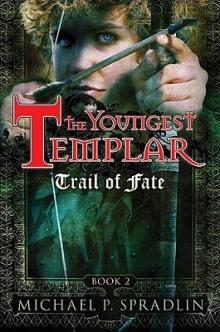 Trail of Fate
Trail of Fate Alcatraz
Alcatraz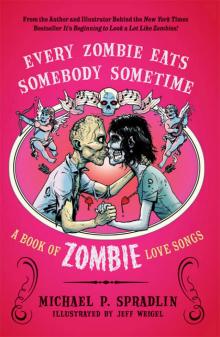 Every Zombie Eats Somebody Sometime
Every Zombie Eats Somebody Sometime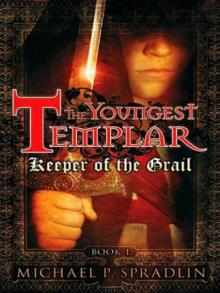 Keeper of the Grail tyt-1
Keeper of the Grail tyt-1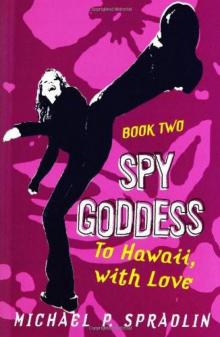 To Hawaii, with Love
To Hawaii, with Love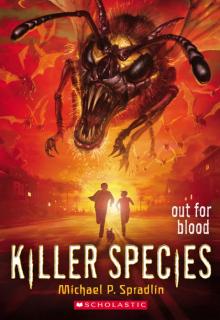 Out for Blood
Out for Blood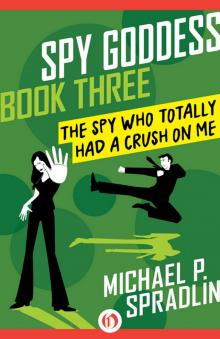 The Spy Who Totally Had a Crush on Me
The Spy Who Totally Had a Crush on Me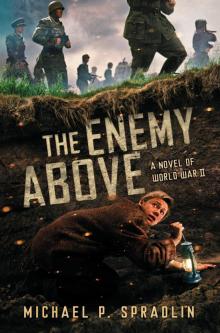 The Enemy Above
The Enemy Above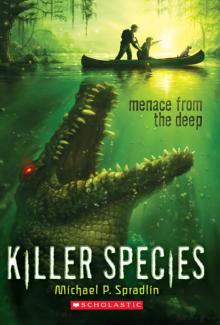 Menace From the Deep
Menace From the Deep It's Beginning to Look a Lot Like Zombies
It's Beginning to Look a Lot Like Zombies Feeding Frenzy
Feeding Frenzy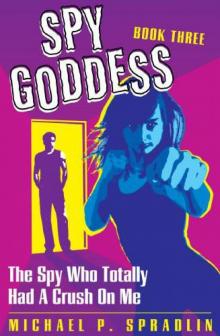 3 The Spy Who Totally Had a Crush on Me
3 The Spy Who Totally Had a Crush on Me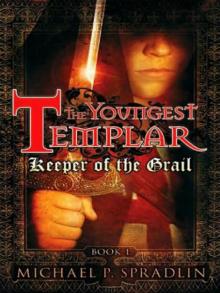 Keeper of the Grail
Keeper of the Grail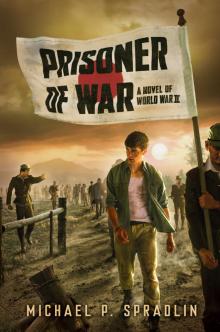 Prisoner of War
Prisoner of War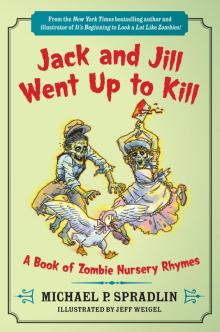 Jack and Jill Went Up to Kill
Jack and Jill Went Up to Kill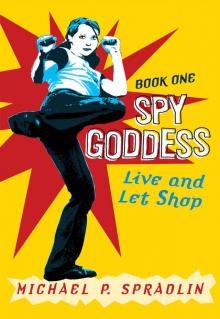 Live and Let Shop
Live and Let Shop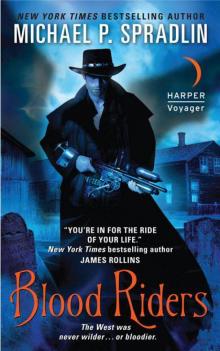 Blood Riders
Blood Riders Ultimate Attack
Ultimate Attack